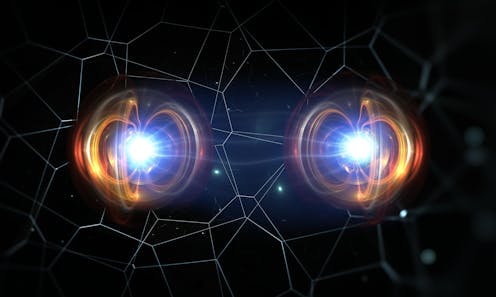Physicists have used entanglement to 'stretch' the uncertainty principle, improving quantum measurements
- Written by Lorcan Conlon, PhD student, Quantum Science & Technology, Australian National University

Almost a century ago, German physicist Werner Heisenberg realised the laws of quantum mechanics placed some fundamental limits on how accurately we can measure certain properties of microscopic objects.
However, the laws of quantum mechanics can also offer ways to make measurements more accurate than would otherwise be possible.
In new research published in Nature Physics[1], we have outlined a way to achieve more accurate measurements of microscopic objects using quantum computers. This could prove useful in a huge range of next-generation technologies, including biomedical sensing, laser ranging and quantum communications.
We were also able to push beyond the limits of a variation of Heisenberg’s “uncertainty principle” in certain circumstances, suggesting different uncertainty principles may be necessary in different scenarios.
Quantum uncertainties
If you want to examine the properties of a large everyday object like a car, it’s a simple process.
For example, a car has a well-defined position, colour and speed. You can measure them one after another or all at once with no issues. Measuring the position of your car will not change its colour or speed.
However, this becomes much trickier if you’re trying to examine microscopic quantum objects like electrons or photons (which are tiny little particles of light).
Certain properties of quantum objects are connected to each other. Measuring one property can influence another property.
Read more: Explainer: Heisenberg’s Uncertainty Principle[2]
For example, measuring the position of an electron will affect its speed and vice versa.
These properties are called “conjugate” properties.
The link between these properties is a direct manifestation of Heisenberg’s uncertainty principle. It is not possible to simultaneously measure two conjugate properties of a quantum object to whatever degree of accuracy you like: the more you know about one, the less you know about the other.
While the uncertainty principle imposes a limit on how accurate some measurements can be, reaching that limit in practice can be very challenging. However, measuring quantum objects in the greatest amount of detail possible is important for advancing fundamental science as well as developing new technologies.
Entangled objects
In our new research, we designed a way to determine conjugate properties of quantum objects more accurately. Our collaborators were then able to carry out this measurement in various labs around the world.
The new technique revolves around a strange quirk of quantum systems, known as entanglement. When two objects are entangled, we can measure them more accurately than if they weren’t entangled.
Read more: What is quantum entanglement? A physicist explains the science of Einstein’s ‘spooky action at a distance’[3]
We realised we could use quantum computers, which can precisely control the state of quantum objects, to create two identical quantum objects and entangle them. By measuring the entangled objects together, we could determine their properties more precisely than if they were measured individually.
Measuring the two entangled identical quantum objects reduces the noise in the measurement, making it more accurate.
A less noisy future
In theory, it is also possible to entangle and measure three or more quantum systems to achieve even better precision. However, we haven’t been able to make this work experimentally as yet.
The results of measuring three identical entangled objects together were very noisy. However, as quantum computers improve and become more accurate, it may be possible to faithfully measure three copies of a quantum system simultaneously in the future.
One of the key strengths of this work is that a quantum enhancement can still be observed in very noisy scenarios. This bodes well for future practical applications, such as in biomedical measurements, which will inevitably occur in noisy real-world environments.
What about the uncertainty principle?
This research also has implications for the aforementioned uncertainty principle.
One interpretation of the uncertainty principle is that it is impossible to measure conjugate properties of quantum objects with unlimited accuracy. But another interpretation is that measuring one conjugate property of a quantum object must necessarily disturb the second conjugate property by some minimum amount.
In this research, we were able to violate an uncertainty principle based on the second interpretation. This suggests that, depending on what physical setting is considered, different uncertainty principles may be necessary for different scenarios.
A global collaboration
We tested our theory on a total of 19 different quantum computers, which used three different quantum computing technologies: superconductors, trapped ions and photonics. These devices are located across Europe and America and can be accessed via the internet, allowing researchers from across the globe to connect and carry out important research.
We carried out the study with colleagues at the ARC Centre of Excellence for Quantum Computation and Communication Technology (CQC2T), in collaboration with researchers from the Institute of Materials Research and Engineering at A*STAR in Singapore, the University of Jena, the University of Innsbruck, Macquarie University and Amazon Web Services.
References
- ^ published in Nature Physics (www.nature.com)
- ^ Explainer: Heisenberg’s Uncertainty Principle (theconversation.com)
- ^ What is quantum entanglement? A physicist explains the science of Einstein’s ‘spooky action at a distance’ (theconversation.com)

















